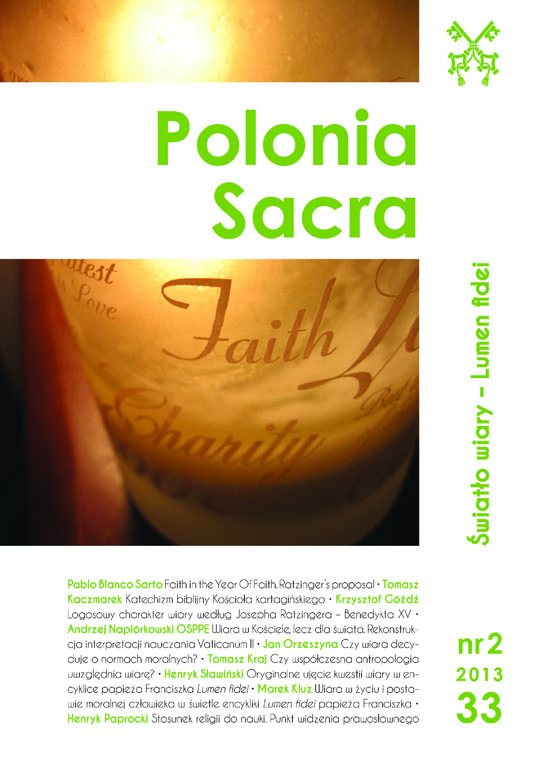Konfrontacja ascetyki Hieronima ze Strydonu i Pelagiusza z Brytanii na podstawie wybranych dzieł
DOI:
https://doi.org/10.15633/ps.377Słowa kluczowe:
Hieronim ze Strydonu, Pelagiusz z Brytanii, asceza, konfrontacjaAbstrakt
Jerome’s meeting with Pelagius could be chance for them, but unfortunately – missed this chance. Saint Jerome shaped by idea of the West theology, but deeply fascinated by East. While Pelagius – too far in his vision of human nature optimistic had strayed into. He became disillusioned with this many people together and instead of typing the current orthodoxy, always will be associated with the heterodoxy. A way of looking at the world and the life environment have an impact on the asceticism Jerome and Pelagius. Jerome’s asceticism was based on the allegorical reading and meditation of the Holy Scriptures, while Pelagius represented the moralistic approach to Bible and Christian life. Jerome postulated the way of Christian pilgrimage to God, where faithful tackling weaknesses by the grace of God and ascetic practice. The good Christian by Jerome should imitate Christ, by honest work, prayer and ascetic practice, consequently – the choice of monastic life. Pelagius the purpose of life – proclaim the glory of God, understood as performing good deeds and practical morality. He wasn’t a Christian understanding of prayer, in exchange for that – he put great emphasis on the obligation to give away all the goods, as a fundamental human ethical excellence. Pelagius postulated already in earthly the community a believer with God, but conditioned by moral perfection.Pobrania
Opublikowane
2013-11-30
Numer
Dział
Artykuły
Licencja
Prawa autorskie (c) 2013 Anita Mularczyk-Budzan

Utwór dostępny jest na licencji Creative Commons Uznanie autorstwa 4.0 Międzynarodowe.
Autorzy publikujący w czasopiśmie udzielają jego wydawcy zgody o następującej treści:
- Autor zachowuje autorskie prawa majątkowe do utworu, a jednocześnie udziela wydawcy czasopisma zgody na jego pierwszą publikację w wersji drukowanej i wersji online na licencji Creative Commons Uznanie autorstwa 4.0 Międzynarodowe oraz zgody na wykonywanie opracowań, w tym przekładów.
- Autor ma możliwość udzielania zgody niewyłącznej na opublikowanie utworu w wersji, która ukazała się w czasopiśmie (np. zamieszczenia go w repozytorium instytucjonalnym lub opublikowania w książce), wraz z informacją o jego pierwszej publikacji w czasopiśmie.
- Autor może umieścić swój utwór online (np. w repozytorium instytucjonalnym lub na swojej stronie internetowej) jeszcze przed zgłoszeniem utworu do czasopisma.
Jak cytować
Mularczyk-Budzan, A. (2013). Konfrontacja ascetyki Hieronima ze Strydonu i Pelagiusza z Brytanii na podstawie wybranych dzieł. Polonia Sacra, 17(2), 231–250. https://doi.org/10.15633/ps.377

